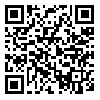Sun, Feb 8, 2026
| فارسی
Volume 30, Issue 1 (Continuously Updated 2024)
IJPCP 2024, 30(1): 0-0 |
Back to browse issues page
Download citation:
BibTeX | RIS | EndNote | Medlars | ProCite | Reference Manager | RefWorks
Send citation to:



BibTeX | RIS | EndNote | Medlars | ProCite | Reference Manager | RefWorks
Send citation to:
Akbarzadeh M M, Imani S, Shahidi S. The Mediating Role of Smartphone Addiction in the Relationship Between Insecure Attachment Styles and Phubbing in Iranian College Students. IJPCP 2024; 30 (1) : 4977.1
URL: http://ijpcp.iums.ac.ir/article-1-4159-en.html
URL: http://ijpcp.iums.ac.ir/article-1-4159-en.html
1- Department of Clinical Psychology, Faculty of Educational Sciences and Psychology, Shahid Beheshti University, Tehran, Iran.
2- Department of Counseling, Faculty of Educational Sciences and Psychology, Shahid Beheshti University, Tehran, Iran. ,s_imani@sbu.ac.ir
2- Department of Counseling, Faculty of Educational Sciences and Psychology, Shahid Beheshti University, Tehran, Iran. ,
Abstract: (3164 Views)
Objectives The present study aimed to determine the mediating role of smartphone addiction in the relationship between insecure attachment styles and phubbing among Iranian college students.
Methods This is descriptive-correlational study using a structural equation modeling (SEM) approach. Participants were 615 college students (334 females, 281 males) with a mean age of 26.89±6.4 years, who were selected using a convenience sampling method from universities in Tehran, Iran. They completed online forms of Hazan & Shaver's attachment styles questionnaire, Sevari’s mobile phone addiction scale, and Chotpitayasunondh et al.’s generic scale of being phubbed.
Results The findings indicated a significant direct relationship between insecure attachment styles (avoidant and anxious) and smartphone addiction (P=0.001, β=0.5), and between insecure attachment styles and phubbing (P=0.012, β=0.16). Moreover, smartphone addiction mediated the relationship between insecure attachment styles and phubbing (P=0.005, β=0.366).
Conclusion The college students with insecure attachment styles (avoidant and anxious) are more prone to smartphone addiction, which can lead to phubbing behaviors. Therefore, interventions should be used for fostering secure attachment styles and promoting healthy mobile use habits to reduce phubbing behaviors and thus enhance interpersonal relationships.
Methods This is descriptive-correlational study using a structural equation modeling (SEM) approach. Participants were 615 college students (334 females, 281 males) with a mean age of 26.89±6.4 years, who were selected using a convenience sampling method from universities in Tehran, Iran. They completed online forms of Hazan & Shaver's attachment styles questionnaire, Sevari’s mobile phone addiction scale, and Chotpitayasunondh et al.’s generic scale of being phubbed.
Results The findings indicated a significant direct relationship between insecure attachment styles (avoidant and anxious) and smartphone addiction (P=0.001, β=0.5), and between insecure attachment styles and phubbing (P=0.012, β=0.16). Moreover, smartphone addiction mediated the relationship between insecure attachment styles and phubbing (P=0.005, β=0.366).
Conclusion The college students with insecure attachment styles (avoidant and anxious) are more prone to smartphone addiction, which can lead to phubbing behaviors. Therefore, interventions should be used for fostering secure attachment styles and promoting healthy mobile use habits to reduce phubbing behaviors and thus enhance interpersonal relationships.
Article number: 4977.1
Type of Study: Original Research |
Subject:
Psychiatry and Psychology
Received: 2024/04/20 | Accepted: 2024/09/16 | Published: 2024/07/31
Received: 2024/04/20 | Accepted: 2024/09/16 | Published: 2024/07/31
| Rights and permissions | |
 |
This work is licensed under a Creative Commons Attribution-NonCommercial 4.0 International License. |






